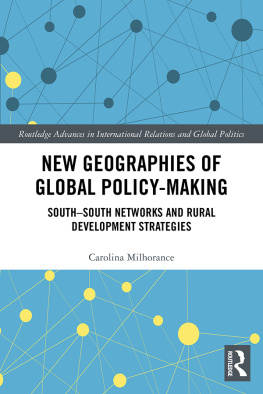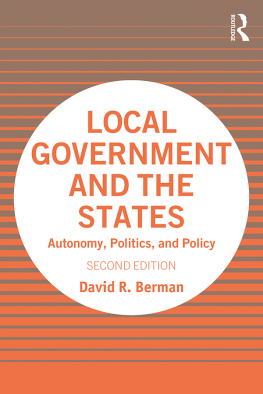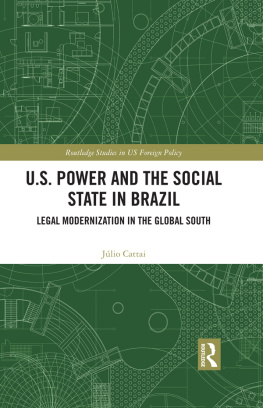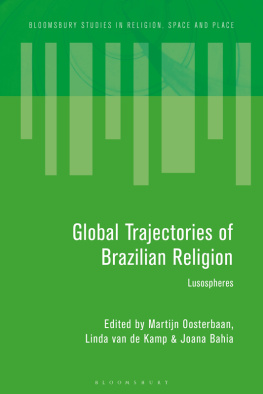This richly detailed analysis of the rise and fall of Brazils market reserve for informatics provides insights into both the art of policy making and the limits of protectionism. Combining archival research with interviews with key players, the text provides fascinating details and some provocative insights.
Melissa H. Birch, University of Kansas, USA
Its time for us to take on the big boys! was a widespread sentiment in Brazil during the seventies and eighties, referring to IBM and other giant globalized informatics enterprises. And so Brazil gave it a try. Its bold and fascinating effort, perhaps the last major ISI project in Latin America, failed in the end. But Sewards bookdeeply researched, extremely well written, analytically richtells this important and instructive tale better and more comprehensively than any other work I know.
At one level this is a case study. In social science graduate training today, rhetoric honors multi-methods but reality often treats case studies as inferior to big data, econometric techniques, formal theory, and formal experimental designs. This book reminds us how indispensable case studies are and how valuable a fine case study can be. At another level the book is informed by and explores theoretical literatures on state autonomy, regime change, varieties of capitalism and the causes and effects of these phenomena. It draws hypotheses from those literatures, tests them with the case study data, and generates new hypotheses from those data.
Finally, in my opinion taken as a whole the book supports a growing trend among scholars to think of political leaders and institutions as critical variables for explaining successes and failures of development (economic, social, political). This may be an unintended feature of the book, which is not explicitly concerned about development very much, but it might be a result of it, and if so a very positive one.
Robert A. Packenham, Professor of Political Science Emeritus, Stanford University; Author of Liberal America and the Third World: Political Development Ideas in Foreign Aid and Social Science (1973, 1976, 2015) and The Dependency Movement: Scholarship and Politics in Development Studies (1992, 1998)
The Politics of Capitalist Transformation
The Politics of Capitalist Transformation is the only book- length study of the highly protectionist Brazilian informatics policy from its origins in the early 1970s to the collapse of the market reserve in the early 1990s and its impact in subsequent decades.
Jeff Seward provides a sophisticated political analysis of how state activists constructed high levels of state autonomy to try to shift Brazil to a new variety of capitalism by eclipsing the multinational companies (especially IBM) that dominated the Brazilian computer sector and replacing them with local companies with 100 percent Brazilian technology and ownership. This ambitious policy required repeated shifts of political strategy and policymaking institutions to respond to a constantly changing economic and political environment as Brazil made a dramatic transition from military dictatorship to democracy.
The innovative framework to analyze state autonomy and the sophisticated political analysis of the policymaking process will be of interest to scholars and students of Brazilian and Latin American political economy, varieties of capitalism theory, state theory, democratic transition theory, and high technology policymaking in developing countries.
Jeff Seward is an associate professor in the Department of Politics and Government at Pacific University. His research interests include comparative politics (with a special emphasis on Brazil and Latin America), political philosophy, political economy, and politics in literature and film.
Routledge Studies in Latin American Politics
6 Representation and Effectiveness in Latin American Democracies
Congress, Judiciary and Civil Society
Edited by Moira B. MacKinnon and Ludovico Feoli
7 Lula, the Workers Party and the Governability Dilemma in Brazil
Hernn F. Gmez Bruera
8 Transnational Activism and National Movements in Latin America
Bridging the Divide
Edited by Eduardo Silva
9 Democracy, Revolution and Geopolitics in Latin America
Venezuela and the International Politics of Discontent
Edited by Luis Fernando Angosto-Ferrndez
10 Transforming Brazil
A History of National Development in the Postwar Era
Rafael R. Ioris
11 Pharmaceutical Autonomy and Public Health in Latin America
State, Society, and Industry in Brazils AIDS Program
Matthew Flynn
12 CivilMilitary Relations in Post-Conflict Societies
Transforming the Role of the Military in Central America
Orlando J. Prez
13 Re-Imagining Community and Civil Society
In Latin America and the Caribbean
Edited by Gordana Yovanovich and Roberta Rice
14 Revolutionary Violence and the New Left
Transnational Perspectives
Edited by Alberto Martn lvarez and Eduardo Rey Tristn
15 Business- State Relations in Brazil
Challenges of the Port Reform Lobby
Mahrukh Doctor
16 The Politics of Capitalist Transformation
Brazilian Informatics Policy, Regime Change, and State Autonomy
Jeff Seward












